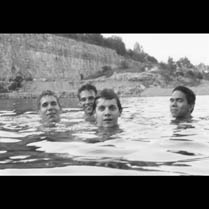
Album: Spiderland
Touch & Go, 1991
Among indie rock geeks, Spiderland is far from obscure, but I've been surprised a number of times recently by musically literate people who have simply never heard of Slint. Here's what you should know: Slint was the first and best of the "math rock" bands, a genre known for changing time-signatures, angular guitars, dynamic contrast and complex composition. It was also essential in kicking off "post rock," making way for bands like Godspeed You! Black Emperor, Sigur Ros and Mogwai.
Spiderland, Slint's haunting masterpiece, has only six songs, each of them telling a different dark story. Brian McMahon's vocals are mostly spoken or screamed (though at times inadvertently tunefully), allegedly because he was too insecure to sing them. This delivery would be annoying in most contexts, but here, it's extremely powerful - McMahon simply lays the dark corners of his mind bare for his audience, without hiding behind a forced melody or song structure. Spiderland is a window into a deeply damaged psyche and its immediacy is startling and deeply unsettling.
Unlike many later post rock bands, Slint never used electronics or orchestral noise, instead focusing on traditional rock-band palette of electric guitar, bass and drums. This makes the music heavy-hitting and aggressive, an effect enhanced by the band's technique of dropping everything to a haunting whisper before slamming more out at top volume. Meanwhile, though the structures borrow more from prog rock than pop, they are clearly conceived with great care, each providing a new alien landscape against which McMahon's stories unfold.
Rumor has it that members of Slint were in and out of mental institutions throughout the recording of Spiderland, and whether or not that's true, Spiderland is one of the most anguished, painful records ever made. "Breadcrumb Trail" tells a story of an innocent romance with a fortune-teller, but the tale is shrouded in ominous details, while "Don, Aman" seems to be a harrowing if enigmatic account of mental illness.
Most chilling of all is the closer, "Good Morning, Captain." Based loosely on Coleridge's "Rime of an Ancient Mariner," the song tells the story the sole survivor of a shipwreck, an old sailor shunned when he seeks help or even witness on shore. Near the end of the song, however, McMahon seems to break down and instead of finishing the narrative, he just starts screaming "I miss you" over and over at the top of his voice until the album's close.
It's a staggering work that sounds like nothing before or since. Musically, it is a pivotal experiment in the use of changing time signatures and contrast dynamics. Emotionally, it protrays agony, horror and dispair with unsurpassed intensity. A landmark album in indie rock, Spiderland should be required listening for everyone.



No comments:
Post a Comment